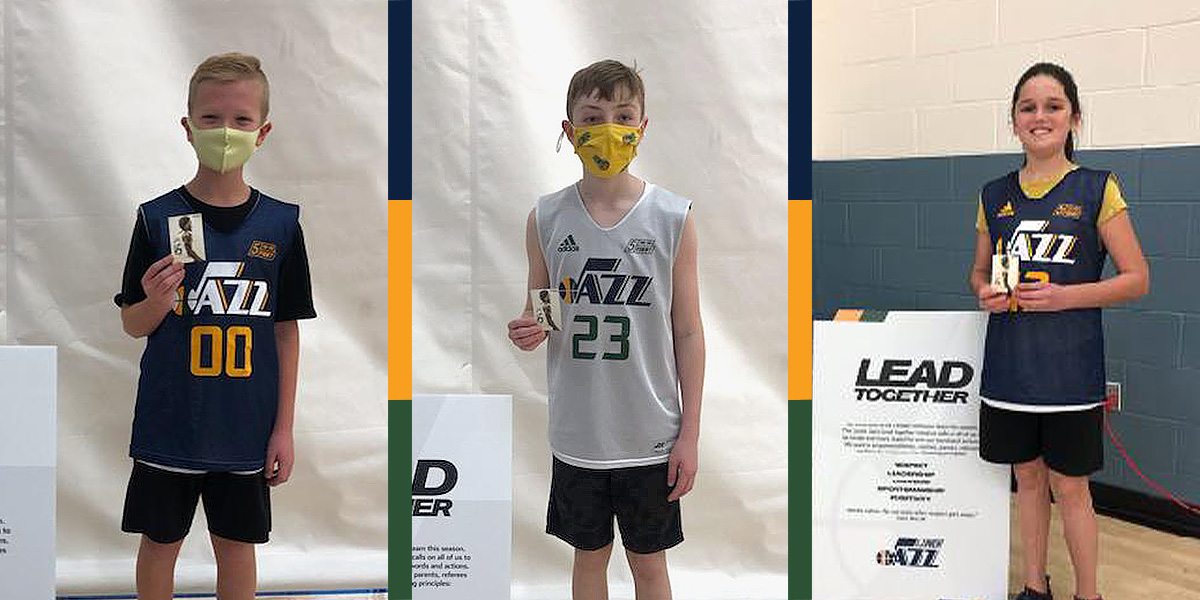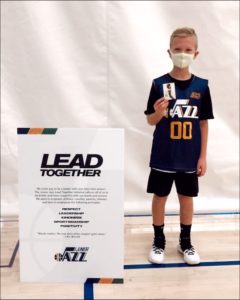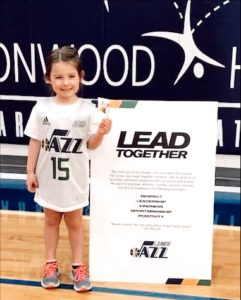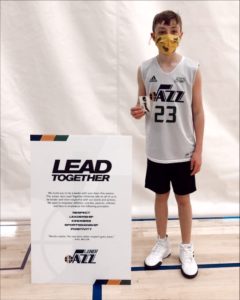Let’s all take the Lead Together

By Katelyn Chambers
Respect, leadership, kindness, sportsmanship and positivity. These five values make up the Junior Jazz Lead Together initiative. This new initiative was inspired by Lead Together, a collaboration among Utah sports teams and athletes, to cultivate a community culture of inclusion and belonging. These principles are now combined with the Junior Jazz sportsmanship program that has been a part of Junior Jazz for the last 14 years. The hope is to not only continue to encourage sportsmanship during all aspects of youth sports, but also add additional values of leadership, respect, kindness and overall positivity. What do these values really look like at the youth sports level?

Respect
Does your child thank their coach, referee or even the opponent’s coach after a youth basketball game? This simple act of appreciation can go a long way to show respect. Coaches volunteer their time and efforts each week to help with youth sports programs, and a simple thank you can make their experience even better. Respect means more than having regard for your teammates and coaches – it also includes respecting the game, following the rules, taking care of the court and building you play in, and most importantly, dignity and honor for yourself. Even when others around us may not show the same respect, it is key to take ownership of our own actions and continue to lead by example, which brings us to our next value, leadership.
Leadership
You don’t have to be the best player on the team to be a leader, anyone can be a leader. The Junior Jazz program can help empower youth to build leadership skills, practice gratitude and gain important life skills that can be used both on and off the court. Leadership requires decision making, and players make many decisions during the game – make a move or not, pass the ball or make a shot? Players can also choose to be a leader to their teammates. Setting a good example by cheering for teammates, helping someone up off the floor, and even clapping when the other team makes a great play, are all easy examples of what any player on any team can do to become a good leader.

Kindness
Kindness is often underrated. It simply means being friendly, generous and considerate. It is so straightforward that it can easily be forgotten in youth sports. We often think about winning and sportsmanship, but what about simple acts of kindness during, before or after youth sports? The world and especially sports can always use more kindness. The best thing about kindness is that it can be contagious. One recreation center in Utah implemented a new idea for their Junior Jazz program this season. They passed out notecards and pens to all parents and spectators in the stands of their Junior Jazz games and asked them to write a note to give to someone during halftime or after the game. It could be their child, a coach, an official, staff, or even another spectator. Handing out notes became a highlight for everyone involved with this program. As simple as it is to write down a sentence or two, this tiny act of kindness can truly brighten a person’s day.

Sportsmanship
Sportsmanship is the value most talked about when it comes to youth sports. How can we take it up a notch or think outside of the box? How can we truly impact youth sports for the better? Sportsmanship is more than telling the other team “good game” and giving high fives. It is about enjoying the spirit of competition, dealing with adversity, practicing discipline, building resilience, being a good teammate and opponent and including others. Players need positive examples of good sportsmanship from the adults in their lives. Do you, as a parent, coach, spectator, or fan of youth sports cheer for the other team when they make a good play? Remember that an adult’s behavior can greatly influence a child’s behavior either positively or negatively. Have you ever yelled at a referee or opposing player at a Utah Jazz game or other professional sport? If a child hears an adult yell at others during sporting events, they may think it is appropriate to yell at others during their youth games. We are all human – referees are going to make mistakes, especially at the youth sports level. A bad call is not going to make or break your child’s success. Players are also going to make mistakes. Let’s encourage everyone around us to find the positive, instead of criticizing.

Positivity
This brings us to the last Junior Jazz Lead Together value: positivity. What is the first thing you say to your child when they get in the car after a Junior Jazz game or practice? Is it something like, “You should have worked harder on defense,” or, “You should have tried to score more,” or, “How many points did you score?” What if the first questions we asked them was if they had fun, if they made a new friend, or what they learned today? Youth sports are so more than just a game. If we focus on having fun, being a good teammate, learning, socializing with our peers, and building skills in sports, our children will learn valuable life skills in addition to basketball skills.
Failure is part of youth sports, we will not win every game we play, but instead of focusing on the overall loss, can you find some positivity that happened during the game? Maybe some good plays or shots were made. Maybe a player had good defense. Failure should be met with positivity, finding ways to improve for the future by trying to reverse negative thinking. Instead of saying, “Too bad we lost that game,” focus instead on, “We made more baskets than we did last game,” or, “Our shooting has really improved.”
There are many things we can do to influence youth sports. First, let’s start with realistic expectation. Everyone is going to have an occasional bad day or lose a game. Let’s focus on the things we can control, like our attitudes and behavior.
This season, the Utah Jazz and the Utah Recreation and Parks Association (URPA) rolled out the Junior Jazz Lead Together Initiative to over 15,000 Junior Jazz participants throughout the state of Utah. After every game, each coach will work with their team to choose a player, fan or parent from the opposing team that has displayed one or more of the Lead Together values. They can even choose a referee, scorekeeper or staff member. The person chosen each game will receive a collectable Utah Jazz player card, as well as an invitation to attend the annual Lead Together Celebration later in 2021.
Gail Miller said it best, “Everyone who walks through the doors of a sporting event, whether it’s a fan, staff member, coach, player, or guest, should expect courtesy, respect, common decency and civility. Words matter, no one wins when respect goes away.”
Let’s all take the lead together.
For more information, to see the Lead Together video or to learn more about the Junior Jazz Lead Together Initiative, by clicking here.
